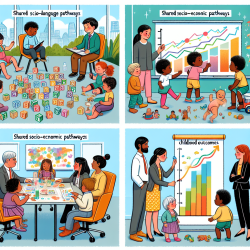Understanding the Link Between Peer Victimization and Dating Violence
As a practitioner in the field of adolescent mental health, staying informed about the latest research can significantly enhance your ability to support young individuals. A recent study titled "The Mediating Role of Internalizing Problems Between Peer Victimization and Dating Violence Victimization: A Test of the Stress Generation Hypothesis" offers valuable insights into the dynamics of victimization among adolescents. This research highlights the complex interplay between peer victimization, internalizing problems, and subsequent dating violence victimization.
The Stress Generation Hypothesis
The study is grounded in the stress generation hypothesis, which suggests that individuals with depressive symptoms may inadvertently contribute to the creation of stressful interpersonal situations. This hypothesis proposes a cyclical relationship where internalizing problems, such as anxiety and depression, mediate the link between peer victimization and dating violence victimization. Essentially, adolescents who experience peer victimization are more likely to develop internalizing problems, which in turn increases their risk of experiencing dating violence.
Key Findings and Implications for Practitioners
The study utilized a longitudinal design with data from the Quebec Youth’s Romantic Relationships Survey, involving 4,923 participants aged 14 to 18. The findings revealed that internalizing problems significantly mediate the relationship between peer victimization and dating violence victimization. This suggests that addressing internalizing problems could be a crucial intervention point to prevent the cycle of revictimization.
- Peer Victimization: Adolescents who are victimized by peers are at a higher risk of developing internalizing problems.
- Internalizing Problems: Symptoms such as depression and anxiety can increase the likelihood of dating violence victimization.
- Gender Neutrality: The study found no significant gender differences in the mediating effects, indicating that these dynamics apply to both boys and girls.
Practical Applications
For practitioners, these findings underscore the importance of early intervention. By focusing on reducing internalizing symptoms through therapeutic approaches, you can help break the cycle of victimization. Here are some strategies to consider:
- Early Identification: Implement screening tools to identify adolescents at risk of internalizing problems.
- Therapeutic Interventions: Provide individual or group therapy focused on managing depression and anxiety symptoms.
- Holistic Approaches: Incorporate family and peer support systems into intervention plans to foster resilience.
Encouraging Further Research
While this study provides valuable insights, it also opens avenues for further research. Exploring additional mediating factors, such as social support and coping mechanisms, could enhance our understanding of these dynamics. Practitioners are encouraged to stay updated with ongoing research to refine their intervention strategies continually.
To read the original research paper, please follow this link: The Mediating Role of Internalizing Problems Between Peer Victimization and Dating Violence Victimization: A Test of the Stress Generation Hypothesis.










